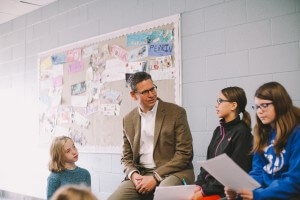April 21, 2016
Last Friday, WCCO-TV featured  senior Allison Leopold (watch the story). Allison made history, winning her fourth medal in the Minnesota State High School Speech Tournament. Allison is only the 51st person to earn that distinction in the 47 years the tournament has been in existence. In any given day at MPA, students learn and practice how to communicate effectively in numerous ways in multiple settings. On Monday mornings, students as young as five stand in front of their peers with a microphone, sharing what they are learning in their classes. I could fill several pages with the many ways students gain confidence in both their ideas and themselves as they learn to communicate.
senior Allison Leopold (watch the story). Allison made history, winning her fourth medal in the Minnesota State High School Speech Tournament. Allison is only the 51st person to earn that distinction in the 47 years the tournament has been in existence. In any given day at MPA, students learn and practice how to communicate effectively in numerous ways in multiple settings. On Monday mornings, students as young as five stand in front of their peers with a microphone, sharing what they are learning in their classes. I could fill several pages with the many ways students gain confidence in both their ideas and themselves as they learn to communicate.
Expressing thoughts clearly, crisply articulating opinions, communicating coherent instructions, motivating others through powerful speech—these skills have always been valued in the workplace and in public life. In today’s 21st century world, with its abundance of news and social media, these skills have become increasingly important. However, if you were to look across public, charter, private, and independent schools, you would be hard-pressed to find communication named as a priority, let alone in the school’s mission statement. You will find it at Mounds Park Academy. “Communicate effectively” is directly stated in our mission, immediately following “think independently.”
More than an extracurricular activity, special project, or course objective, communication is an important 21st century skill necessary for success in today’s society and workforce. In the report, “Are They Really Ready to Work?” published in 2006, employers noted that although oral and written communication are among the top four skills they seek in new hires, they find all graduates are lacking in these areas. High school graduates fare the worst, with 81 percent of employers citing this group’s deficiency in written communications and 53 percent reporting a deficiency in oral communication.
More recently, in the 2013 Job Outlook survey conducted by the National Association of Colleges and Employers, the highest rated skill was “the ability to verbally communicate with persons inside and outside the organization.” As our society evolves from the industrial age and ideas, processes, and knowledge are shared collaboratively, effective communication is even more crucial. Authors and economists, Frank Levy and Richard J. Mundane, have written extensively about communication in today’s workplace. Because complex communication involves explanation, negotiation, and other forms of intense human interaction, jobs that require these skills are not as likely to be automated.
Effective communication is indeed important for success in the workforce. However, it is also necessary to be successful in society. Without pointing fingers, the lack of intelligent and civil discourse in politics today demonstrates that the absence of real communication breeds disharmony and lack of trust and leaves us isolated and insulated. The health of our society depends on our ability to engage others’ perspectives and come to new understandings though respectful conversation and dialogue.